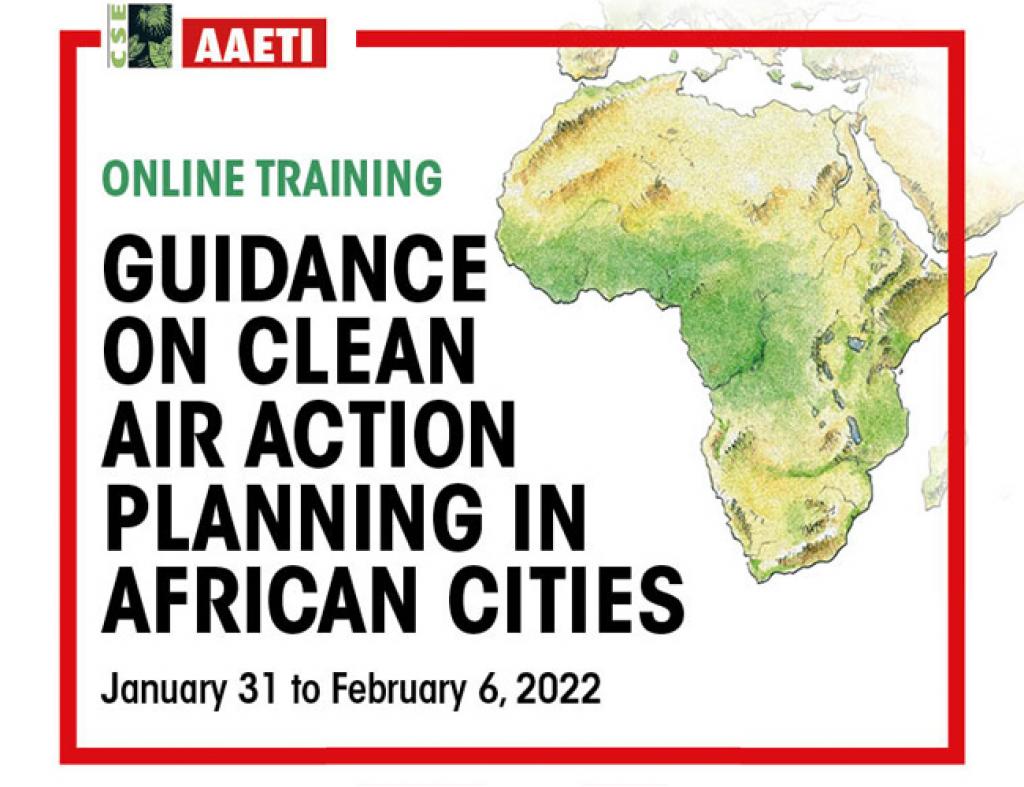Online training Guidance on clean air action planning in African cities
Air pollution is the fourth leading risk factor for premature deaths globally. Particulate pollution is a serious concern as over 90 per cent of the world’s population live in areas exceeding the PM2.5 WHO guideline. Africa is also in the grip of particulate pollution as it reports the highest annual average PM2.5 exposure. With limited air quality monitoring and management higher daily exceedance poses a challenge in African cities.
This has made it necessary for the national and city governments in the countries of Africa to prepare and implement a clean air action plan for time bound improvement in air quality even as their economy is growing. Rapid urbanisation, motorisation and sprawls are making African cities victims of killer pollution and congestion that threaten to destroy quality of life. Clean air action planning and implementation is therefore imperative for cities. There is a need to improve air quality monitoring and data analytics to estimate air quality trends, assess health risk, identify key pollution sources, and implement pollution source-wise strategies to meet the clean air target. A range of strategies will have to be designed and developed including air quality monitoring and management, clean vehicle technology and fuels roadmap, reduce importation of used vehicles, in-use vehicles emissions reduction, protect sustainable travel modes such as non-motorised transport (NMT) -- walk, cycle and informal and formal bus transport and vehicle restraint measures such as parking policy to reduce travel demand and address industrial pollution.
Centre for Science and Environment (CSE), a New Delhi, India based public interest research and advocacy organisation that has been researching and building capacity for air quality management and clean air action plans, offers this online (self-paced) training to provide guidance on clean air action planning and build knowledge and regulatory capacity of officials from concerned departments and agencies in the African countries. This training represents our initiative to promote good regulatory practices, facilitate exchange of ideas, build knowledge and strengthen capacity in countries of the Africa region to address the emerging challenge of air quality monitoring and management.
Course structure: This online training will be conducted on the Moodle and Zoom platform through a variety of tools such as recorded video lectures, quiz/exercises, reading materials and resources, audio/visual methods including short films etc. It will cover a range of issues including:
- Understanding urban air quality and public health challenges
- Strategies to strengthen air quality monitoring and adoption of new generation approaches including low cost sensor based monitoring and remote sensing based air quality assessment
- Understanding pollution source inventory and source apportionment
- Preparation of pollution source-wise clean air action planning
- Designing of specific strategies related to clean vehicle technology and fuel quality roadmap including vehicle import policy and towards zero emission vehicles
- Planning for sustainable transportation systems including NMT, informal and formal bus transport and vehicle restraint measures including parking policy
- Mitigation strategies for industrial pollution – clean technology and clean fuel strategies for big and small scale industry
- Waste management strategies for controlling emissions from waste burning
- Strategies for dust control with special focus on construction and demolition
As this is a self-paced training it is designed in such a way that it can be completed along with a regular job
For more information, please contact
Priyanka Chandola
Mobile: +91 – 9810414938
Email: priyanka@cseindia.org
Shourabh Gupta
Mobile: +91-8826806794
Email: shourabh.gupta@cseindia.org
| Flyer | |
 |
|
| Download flyer | |
| Course Dates | |
| January 31 to February 6, 2022 | |
| Who can apply? | |
| Officials from diverse regulatory departments and agencies involved with policies and implementation related to air quality monitoring and management, clean vehicle technology and fuel quality, vehicle import policy and sustainable mobility in African countries | |
| Participants will be awarded a certificate of participation on completion of the course |

Share this article